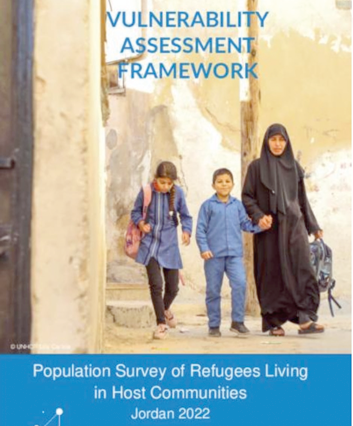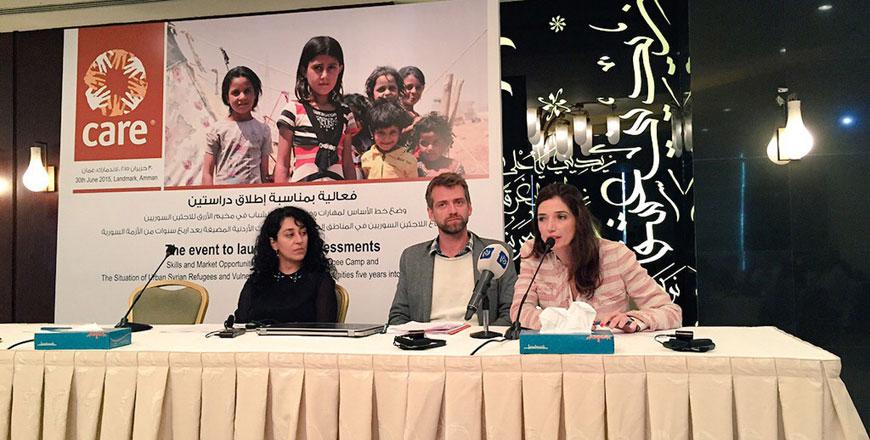You are here
Debts weigh heavily on Syrian refugees — UNHCR survey
By Rayya Al Muheisen - Sep 06,2022 - Last updated at Sep 06,2022

The cover of the UNHCR report
AMMAN — Economic conditions have worsened for many Syrians since 2018 as a higher proportion of Syrians reported holding debt in 2021.
A UNHCR Jordan-issued report titled “Vulnerability Assessment Framework: Population Survey for Refugees in Host Communities”, found that currently, 62 per cent of Syrian refugees need to buy food on credit, and 11 per cent are being forced to sell productive assets. Debt per capita figures are high, with the average Syrian refugee individual holding JD343.1 in debt, according to the report.
Meanwhile, 62 per cent of individuals who report severe vulnerability in terms of shelter are also more likely subject to a lack of or poor water sanitation and hygiene (WASH), according to the survey, which sampled 6,427 refugee households residing in host communities.
“Seventeen per cent of individuals who face severe difficulties in meeting their basic needs also face severe health vulnerability,” the report added.
The report stated that 15 per cent of individuals who face severe education vulnerability also face severe food insecurity.
Furthermore, total expenditure continues to exceed total income, pushing many families into cycles of debt, the report added.
The report noted that the Government of Jordan estimates that around 1.3 million of the 6.7 million Syrians who have fled their country since 2011 now reside in Jordan.
Healthcare
“Nineteen per cent of Syrian families have either two or more children under five years old, placing them at high or severe levels of vulnerability,” the report added.
The report stated that 31 per cent of Syrians noticed an increase in healthcare costs over the last year, which mostly resulted in an inability to visit a physician and not being able to afford necessary medical procedures or medication.
“Eighty-eight per cent of Syrians were impacted by increased health costs, which resulted in reducing both healthcare visits and medications procurement,” the report stated.
Education
Last year, 136,000 out of an approximated 233,000 school-aged Syrian refugee children were enrolled in formal education, according to the report.
“Over 200 schools in the host community continue to operate a two-shift system, with afternoon shifts for Syrian children,” the report added.
However, Syrian families still face a number of barriers to ensuring all their children are able to enrol and remain in school.
“Among Syrians, those who have never attended school represented 18 per cent of the school-aged population,” the report added.
Employment
The report stated that refugee populations are vulnerable to unemployment and poor work conditions given the widespread reliance on informal employment.
“Only 6 per cent of refugee respondents in Jordan have a valid work permit,” the report noted.
The report added that the employment rate among those surveyed stood at 33 per cent for Syrians. Furthermore, gender was found to be a strong predictor of labour force participation and employment.
“Only 12 per cent of interviewed women participate in the labour force, compared to 71 per cent of men,” the report added.
Meanwhile, the report stated that 75 per cent of the individuals outside of the labour force are women.
Disability
“Thirty-four per cent of families report having at least one member with one or more disability,” the report added.
However, only 6 per cent of those aged 5 to 11 and 7 per cent of children aged 12 to 17 are considered disabled. The percentage jumps to 18 per cent among those aged 18 to 59, and to 55 per cent among those above 60 years of age, according to the report.
Related Articles
AMMAN — The government must implement laws and policies to counter child labour, which has tripled in Jordan over the last decade, organisat
AMMAN – Despite significant progress in human development over the past 25 years, Arab countries have the highest youth unemployment rate an
AMMAN — Around 80 per cent of Syrian refugee families living among host communities across the Kingdom said their main concern is paying ren
















